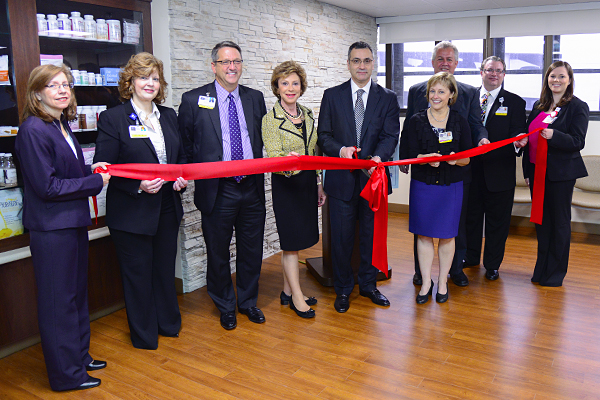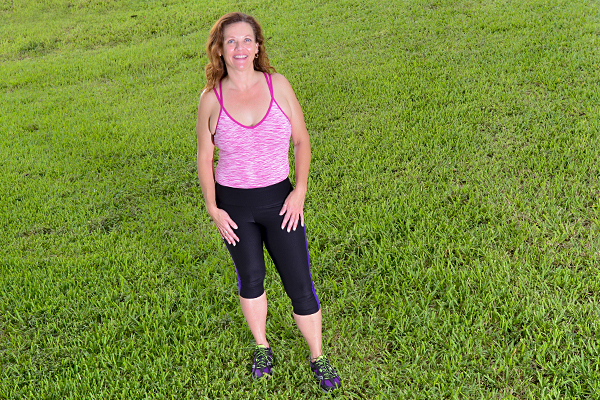Jeana Hadley considers herself a decent example of good health – she eats right, exercises and maintains a healthy weight. But that model of healthy living is worlds away from the path she was on five years ago, when she weighed 300 pounds.

Jeana Hadley said the desire to live for her family when confronted with an obesity-related heart scare motivated her to commit to weight-loss surgery and a new healthy lifestyle.
What caused her to turn things around, to stop overeating, to stop secretly eating, and to finally be able to stick to (at least most of the time) common sense food choices and serving sizes?
Hadley doesn’t hesitate with an answer. It’s because of bariatric surgery. More specifically, its’ because of the team of experts at the TGH+USF Bariatric Center who, well before her surgery, looked at every aspect of her struggle with obesity: her co-morbid conditions, her eating and exercise habits, and her tendencies and associations with food.
“The bariatric surgery saved my life, but it was the entire team who helped me to succeed with keeping the weight off for these five years,” Hadley said.
****
Obesity is complicated and can only be treated successfully when a high level of attention is given to every issue that surrounds it.
That’s why the TGH+USF Bariatric Center has grown to be so successful – it is staffed with experts trained to address every issue related to the patient’s obesity. Those issues not only include the secondary health problems that haunt obese patients, such as diabetes, sleep apnea and hypertension, but the other aspects of obesity that have kept these patients from keeping their weight down in the past, such as the psychological reasons for overeating and the physical issues of exercise.
“We are looking at the patient as a whole and helping them with every area that is keeping them from succeeding,” said Michel Murr, MD, professor of surgery at the USF Health Morsani College of Medicine and director of TGH+USF Bariatric Center.
USF has been offering bariatric surgery since 1998 and has gained a national reputation for its integrated and comprehensive approach. In 2013, the team moved into a 5,500-square-foot facility in the Harbourside Medical Tower on the Tampa General campus. The expanded space features examination rooms and education rooms where patients work with Center staff as they progress through the program. Anyone interested in bariatric surgery must attend an informational session held at the Center weekly. Patients admitted to the program then spend three to six months learning the nuances of what bariatric surgery means – the life-long commitment and dietary regimen they face – before surgery is performed.

USF President Judy Genshaft and Dr. Murr, center left and right, with officials from Tampa General Hospital and USF Health, at the grand opening last year of the TGH+USF Bariatric Center.
At its core, Dr. Murr said, the TGH+USF Bariatric Center offers patients a truly interdisciplinary approach to treating obesity.
“When we started this program in 1998, we knew the value of an interdisciplinary approach to treating patients,” he said. “It’s used extensively and successfully in the treatment of cancer. And we know the importance of continued follow-up care, the very same idea used so successfully in cardiac rehabilitation.”
But in the management of obesity, these approaches tend to be absent, he said.
The team at the USF Bariatric Surgery Program offers patients surgeons, dieticians, psychologists, internists, exercise physiologists, among others. Basically, there is an expert for every health issue facing obese patients, Dr. Murr said.
“Patients are successful because we help them with every roadblock and issue they are likely to face,” he said.
****
Jeanna Hadley vividly remembers the day she decided to pursue bariatric surgery. It was in 2007.
She had already faced doctors diagnosing her with high-blood pressure, acid reflux, ulcers, and prediabetes. And her family history made her realize she could die young – Hadley’s father died of a heart attack at age 56. Her grandfather died in his 40s.
The clincher, however, – the moment that awakened something unstoppable inside of her – was when she had her own heart scare at age 40. Knowing her family history helped elevate the panic she felt when doctors prescribed a round of heart tests.
“I was a single mom and I realized no one else would raise them like a mother could,” she said. “I realized I needed to live.”
Hadley’s bariatric surgery was on June 29, 2010.
“There was a little pain, but overall, totally manageable,” she said. “Of all the improvements this surgery provided, what happened fastest was that my high blood pressure returned to normal immediately after surgery. It really worked! Now I don’t have to take these stupid blood pressure pills anymore.”
In addition to reversing her high blood pressure, the surgery also caused Hadley’s sugars, triglycerides and cholesterol numbers to improve, dropping by half.
“Body-wise, the surgery was like a chemical re-set button,” she said.
Because success depends a lot on the individual, Hadley was adamant with herself to stay on track, starting with some of the “techniques” even before the surgery.
“I followed the guidelines to the letter,” Hadley said. “I figured I had made the monumental decision to have the surgery and I actually had the surgery, so why would I do something to screw things up and keep the surgery from helping me succeed.”
She even started her routines before surgery, measuring foods to get a feel for the right amount and keeping a food journal, Hadley said.
Post-surgery, starting in the hospital, compliance meant a clear liquid diet for three days, followed by a few days of a full liquid diet that included protein shakes, then four weeks of soft, pureed foods, mostly protein based.
“They said I could eat strawberries after six weeks but I didn’t have any for six months, that’s how obsessed I was with doing this right,” she said. “I pureed everything. The mini food processor and I got really close those first few months.”
Central to every step, though, was protein.
“Protein has to be a focus and includes supplements,” said Erica Govsyeyev, MS, RD, LDN, clinical nutrition specialist and a dietitian for the TGH+USF Bariatric Center. “There is no wiggle room when you’re eating such small amounts so it’s important to get as many nutrients as possible with each meal.”
While most people should aim for 45 to 60 mg of protein each day, Govsyeyev said, bariatric patients should nearly double that, aiming for 60 to 80 mg each day.
Today, Hadley still eats very small meals focusing on healthy choices, including lean proteins (fish, skinless chicken and lean beef).
Her 5-year path from surgery to this point went something like this:
- Her weight went from a peak of 300 pounds to 285 prior to surgery to a low of 133 a year later, a weight she realized was too low so now she hovers in the low 150’s (she’s 5’6” tall). She weighed herself every day for several years, but now only every few days.
- Post-surgery was a six-week gradual increase in food density: a liquid diet to soft foods to regular food (only about three ounces at each meal). Today, she eats four to six meals each day, each about four to five ounces, depending on the density of the food.
- Pre-surgery and immediately post-surgery, she could barely walk a mile. By four months after surgery was able to walk five miles. Then she started running. And now is running regularly and racing in marathons.
- Since the surgery, she takes daily supplements of specialized multi-vitamins, calcium and vitamin D, gets B12 shots twice a month and an iron infusion once a year for anemia, a side effect for some bariatric patients.
*****
USF’s Bariatric Surgery Program is standing out nationally, not just for its team approach for treating patients, but also because the team tracks each patient’s progress both during the program and for more than five years after surgery. The goal is to pinpoint what is working and what is not working for the patients, Dr. Murr said.
“We are evidence-based and outcome-driven,” he said.
That kind of data is what Dr. Murr is publishing in journals and sharing with colleagues around the globe. The results are showing that bariatric surgery works and there are immediate and long-term improvements to the co-morbid conditions of obesity, such as diabetes, hypertension, sleep apnea and stress urinary incontinence.
Some of Dr. Murr’s newest research is showing that bariatric surgery can also result in significant improvement in nonalcoholic fatty liver disease (NAFLD), resolving liver inflammation and reversing early-stage liver fibrosis, the thickening and scarring of liver tissue, by reducing fat deposits in the liver.
Data are also showing that, because of the intense team approach, these patients are successful in keeping their weight under control.
Team Approach
The process is this.
First, patients undergo an initial evaluation and are provided with information about the surgery, which lays out what their realistic expectations should be.
Then patients attend several support groups and an orientation program that describes the surgery, its outcomes, its long-term effects and who qualifies for it. This gives them a realistic snapshot of what surgery is and what it means for the rest of their lives.
Next is an extensive psychological evaluation, where patients and psychologists really delve into a patient’s perception of health, the surgery and the life-long commitment it requires.
If patients have passed muster to this point, they then meet with team members to set up a personalized plan for post-operative care and follow-up, including extensive input from dieticians and exercise physiologists.
“Surgery doesn’t fix everything,” dietitian Govsyeyev said.
Govsyeyev meets with bariatric patients like Hadley long after their surgeries, using realistic food props to help illustrate portion size and a meal’s health components.
“You’re still going to have challenges and stresses,” she said. “We work to define areas where they may struggle to help set them up for success.”
In addition, many secondary problems are addressed: high blood pressure is under control, sleep apnea is under control, etc.
Only at this point do they undergo bariatric surgery.
The entire process can take six weeks or more, but that pace is a good thing, Dr. Murr said.
“Each patient has to have all of the information necessary to make such a huge decision and to be completely sure that surgery is right for them and that they know full bypass is not reversible,” he said. “They have to have realistic expectations of the surgery. I want them to be ready and not rush to a decision.”
This extensive process offers the best outcomes with the fewest complications, he said.
The team approach is so powerful that many times a patient will not require surgery in order to successfully manage their weight. Many times, it’s during that intense evaluation that a patient’s core problems are addressed, and a plan is defined that will help the patient succeed without having to go to the extreme of bariatric surgery, Dr. Murr said.
****
At home, Hadley is straightforward with her boys.
“Before the surgery, I told them ‘This is what Mommy is doing and I need your support,’” she said.
Her boys, ages 15 and 17, never had a problem going along with her new health and food regime.
“They were great,” she said. “They never told me ‘I’m not eating that!’ And the boys are healthier because I’m paying so much more attention to healthy foods. They are so much healthier than I was at those ages. But I tell them they still need to watch. They still have our family genes.”
For Jeana Hadley, the surgery saved her life. She even continues attending the educational sessions at the Bariatric Center, although this time she brings the post-operative patient perspective.
“Now I’m sharing my success story with people considering the surgery,” she said. “I tell them ‘I was where you are now,’ because I know how great it is to talk to someone who has already gone through the journey.”
“And the USF team was great and was in touch with what my individual needs were.”
To hear more about the TGH+USF Bariatric Center, please call (813) 844-7473.

Notes from Jeana Hadley
– Form good habits: start a food log and measure food before the surgery. Better yet, start before the education sessions. “We’re all creatures of habit, so establishing habits ahead of time makes it much easier after surgery.”
– Make the best use of the education sessions. Keep attending to reinforce the information and tips.
– Your taste buds will change. Everything will taste differently. “Diet drinks now taste sour.”
– Know your limit: Always measure because, while one piece should satisfy, more will make you sick.
Photos by Eric Younghans, USF Health Office of Communications


